For Christian families, the most sensitive element of the school curriculum is which Bible program to choose. There are the universal concerns: is it orthodox? does it focus on Scripture knowledge or doctrine? is it age appropriate? do I agree with the perspective and/or denominational perspective presented in the material? But, because it's curriculum we're talking about, there are other concerns as well.
One of the main ones for Bible curiculum seems to be, Can my kids do it on their own, or do I have to do it with them? Allow us to make a suggestion concerning that question before we proceed any further. We've heard it so often, and answered it so many times, that we feel it's time to address it publicly. That's not the right question.
First of all, teaching your kids the Bible is the most important thing you'll ever do for them. As the Word of God, we're required to present it to our kids (Deut. 6): our children are a stewardship presented to us by God, and it is our duty to mediate His Scripture to them. To shirk that duty isn't an option, and Bible curriculum helps us accomplish this task.
Second, performing this duty should be seen as a joy and privilege rather than an onerous responsibility. It is a responsibility, but one that brings life both to our children and ourselves, and one we should accept and embrace wholeheartedly. God's Word transforms all who hear it, and it should be one of our greatest pleasures to share it with the children we love and raise.
A more appropriate question might be, How much Bible knowledge do I need to have before jumping into such and such a course? There are a thousand reasons we might not know as much as we want or ought, and if a particular curriculum requires us to draw on information we don't possess ourselves in order to teach our kids, we're out of luck. Fortunately, all the programs we carry are accompanied by teacher's guides.
There are basically two approaches to Bible curriculum: courses focused on Bible knowledge, and those concerned primarily with doctrine. Our favorites all come from a Reformed perspective (which we share), though even those are mostly non-denominational and focus on the universal doctrines of the Church rather than particular distinctives of sects or groups. A third approach focuses on character building, but we'd encouage you to look at our Character Curriculum section for courses that take that route.
Here is a quick summary of the Bible curricula we've reviewed, in alphabetical order:
 |
Telling God's Story Grades 1-4 *
Telling God's Story is unique among homeschool Bible programs, presenting liberal and borderline-heterodox perspectives we can't in good conscience promote or provide. You'll find extensive reviews here on our site, as well as more complete defenses of our own positions. Besides evolution, the author promotes suspect views of the incarnation of Jesus and the inspiration of Scripture.
|
 |
A Beka Bible Grades K-12 *
Some may find it odd that we include Bible programs on our website that we neither promote nor carry: A Beka Bible is one of them. While we strongly disagree with the Dispensational perspective presented, the moralizing tone, etc., we do admit that the course is orthodox on the most important points. However, we prefer other courses, including BJU Bible Truths.
|
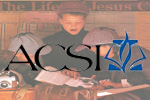 |
ACSI Bible Grades k-12 *
The good part of avoiding doctrinal distinctives: anyone can use the course. The bad part of avoiding denominational distinctives: a lot of solid content will have to be left out or glossed. Such is the quandary for users of ACSI Bible, a visually-oriented, teacher-intensive course that spends more time teaching godly behavior than the major tenets of the Christian faith.
|
 |
AOP Lifepacs: Bible Grades 1-12
AOP Lifepacs: Bible (for grades 1-12) are workbook-based, not chronological, and tending toward the "Bible story" variety. Major doctrines are presented from a historic creedal perspective, with no obvious denominational bias. It's hard to maintain objectivity when teaching Bible content, but the authors of this course have managed to do so quite admirably.
|
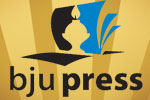 |
BJU Bible Truths Grades K-12
BJU Bible Truths takes a very well-rounded approach, presenting general overviews of Scripture in the elementary grades, and more detailed theme studies (life of Christ, etc.) for high schoolers. This is an excellent course, though not as doctrinally-oriented as we'd prefer. This is probably just as well, as the authors are Dispensational and Baptist rather than Reformed.
|
 |
BJU Bible Modular Series Grades 7-12
BJU also offers the Bible Modular Series for high school kids, small books designed to teach doctrine, wisdom, righteous living, and apologetics. The Bible Modular Series can either supplement or provide an alternative to the Bible Truths course. The texts are well-written, the content theologically deep, and the exercise questions challenging and application-oriented.
|
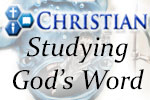 |
CLP Studying God's World Grades K-8
One of our favorite programs for elementary through middle school students is CLP Studying God's Word, which presents the flow of the biblical narrative in workbook format, along with important doctrines (particularly in Book B). The authors are Reformed, but the content is mostly broadly Evangelical and appropriate across a spectrum of denominations.
|
 |
Covenantal Catechism Grades K-8
Covenantal Catechism is a workbook introduction to basic Reformed beliefs, and can be used with a variety of age-levels, though the stilted language probably makes it easier for older kids. Students are walked through the biblical narrative using the three ecumenical creeds, the Three Forms of Unity, and the Westminster Confession and catechisms as guides.
|
 |
CSI Bible Grades 6-12 *
Easily the best, but also the most challenging, of the Bible survey courses are the books from CSI Bible. Approaching the biblical narrative from a Reformed/covenantal perspective, the books cover the Old and New Testaments for middle and high school students. These aren't as visually appealing or engaging as other courses, but they're far more informational and just plain good.
|
 |
Explorer's Bible Study Grades K-12 *
The Explorer's Bible Study follows the workbook approach, and covers everything from preschool to high school to adult-oriented study. These are Bible-study oriented rather than theological, imparting knowledge of the biblical narrative, its principle characters, and important doctrines, all from a non-denominational perspective that emphasizes obedient living.
|
 |
God's Great Covenant Grades 2-5
For integration of doctrinal education with a presentation of the Bible as God's narrative, God's Great Covenant (from a Reformed stance) is a fantastic choice. Intended for younger students, this course could easily be used as late as middle school, largely because its authors take a serious and in-depth approach not found in most Bible curricula at any level.
|
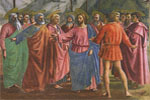 |
Memoria Press Christian Studies Grades K-7
Memoria Press Christian Studies for grades 3-7 doesn't emphasize doctrinal information, concentrating instead on a higher level of Biblical knowledge (though not enough to use with high schoolers). Potential buyers will want to be aware that the texts seem somewhat Catholic at times.
|
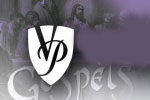 |
Veritas Press Bible Materials Grades 2-12
Perhaps a good lead-up to the more advanced Covenantal Catechism would be the Veritas Press Bible Materials, also Reformed but focusing on the flow of biblical history rather than specific doctrines, and best-suited for younger students. Kids use colorful cards and hands-on activities to get a feel for the overall trajectory and flow of the biblical narrative.
|
* There are some programs we don't currently carry: ACSI Bible (though we can easily get it), CSI Bible (the publishers don't sell to bookstores), Firm Foundations, and the Explorer's Bible Study curriculum. We can make no guarantees that any of these will be in stock, but as each of them has its particular strengths we'll gladly take and sell what we can used.
We strongly believe Bible learning should involve both doctrine and the biblical narrative. But we're just as convinced that Bible study shouldn't just be relegated to a school subject; instead, it needs to be an integral part of everyday life, a constant referent for all discussion and behavior between parents and their children.
However, there needs to be actual focused Bible study, too, and that's where Bible curriculum comes in. Kids need to learn about God's story and God's character specifically from as early an age as possible, and these guided courses can help you ensure they get the knowledge and information they need, the only knowledge that leads to everlasting life.
Review by C. Hollis Crossman
C. Hollis Crossman used to be a child. Now he's a husband and father who loves church, good food, and weird stuff. He might be a mythical creature, but he's definitely not a centaur. Read more of his reviews
here.
Did you find this review helpful?